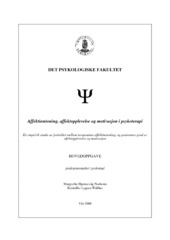| dc.contributor.author | Norheim, Margrethe Hjønnevåg | |
| dc.contributor.author | Walther, Kristoffer Lygren | |
| dc.date.accessioned | 2013-11-05T11:39:19Z | |
| dc.date.available | 2013-11-05T11:39:19Z | |
| dc.date.issued | 2008-04-15 | eng |
| dc.date.submitted | 2008-04-15 | eng |
| dc.identifier.uri | https://hdl.handle.net/1956/7483 | |
| dc.description.abstract | This study is an attempt at getting a better understanding of the relationship between the therapist's affect attunement and the patient's motivation, and find out to what degree the patient's experience of affect contributes to this relationship. It was assumed that affect attunement would lead to a more profound experience of affect, which again would increase motivation for therapeutic change. The selection comprises 18 videotaped first-sessions encounters across a variety of different psychotherapeutic modalities. The Affect Attunement Scales (AAS) were used to assess therapist levels of affect attunement, and the Achievement of Therapeutic Objectives Scale (ATOS) was applied for assessing the patient degree of affect experience and degree of motivation. The results revealed that the patient's degree of affect seems to play a pivotal part in explaining the relationship between affect attunement and motivation. The results further suggested that higher levels of affect attunement in the therapist`s response, was followed by increased levels of affect experience in the patient, which again predicted higher levels of patient's motivation. Following the results, the present study emphasizes the importance of therapist's affect attunement and the patient's affect experience in order to explain what leads to motivation for change in a therapeutic setting. | en_US |
| dc.description.abstract | Det følgende studiet er en prosesstudie som tar sikte på å belyse hva som bidrar til endring i terapi. Vi ønsker å se på forholdet mellom terapeutens grad av affektinntoning og pasientens grad av motivasjon og hvor stor grad affekt påvirker dette forhold. For å studere dette har vi sett videoopptak av 18 førstegangsmøter mellom terapeut og pasient, og registrert terapeutens grad av affektinntoning og pasientens grad av affektopplevelse og motivasjon hvert andre minutt. Affect Attunement Scales (AAS) ble anvendt i forhold til å skåre terapeutens grad av affektinntoning, mens the Achievement of Therapeutic Objectives Scale (ATOS) ble brukt til å registrere pasientens grad av affektopplevelse og grad av motivasjon. Følgende hypoteser ble framsatt; 1) Det er en sammenheng mellom terapeutens grad av affektinntoning og pasientens grad av motivasjon. 2) Pasientens grad av affektopplevelse påvirker denne sammenhengen. 3) Nivået av affektinntoning i første del av terapien vil predikere pasientens grad av affektopplevelse i den midtre delen av timen som igjen vil predikere grad av motivasjon i siste del av timen. Resultatene gav støtte til samtlige hypoteser. | en_US |
| dc.format.extent | 309464 bytes | eng |
| dc.format.mimetype | application/pdf | eng |
| dc.language.iso | nob | eng |
| dc.publisher | The University of Bergen | eng |
| dc.subject | Affektinntoning | eng |
| dc.subject | Affektopplevelse | eng |
| dc.subject | Motivasjon | eng |
| dc.subject | Prosessforskning | eng |
| dc.title | Affektinntoning, affektopplevelse og motivasjon i psykoterapi. En empirisk studie av forholdet mellom terapeutens affektinntoning, og pasientens grad av affektopplevelse og motivasjon | eng |
| dc.type | Master thesis | |
| dc.rights.holder | Copyright the author. All rights reserved | |
| dc.description.localcode | PSYK300 | |
| dc.description.localcode | PRPSYK | |
| dc.subject.nus | 736102 | eng |
| fs.subjectcode | PSYK300 | |
